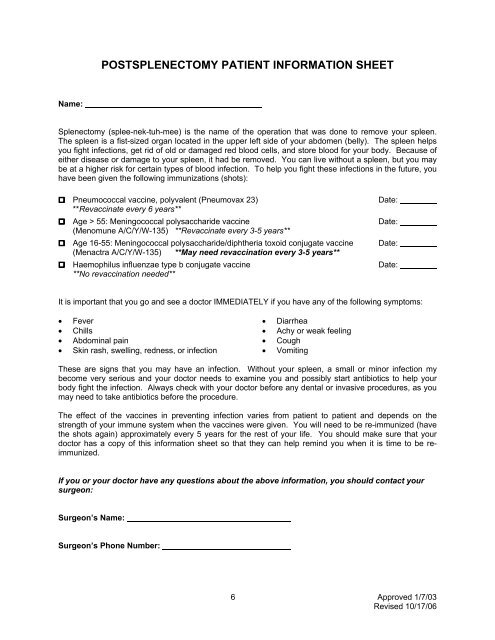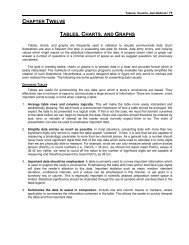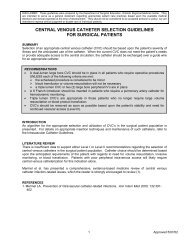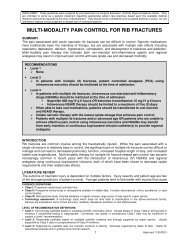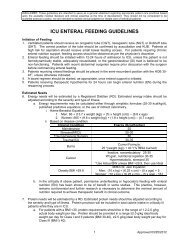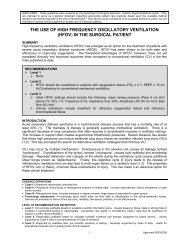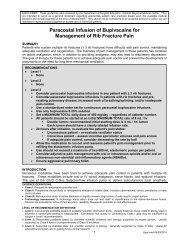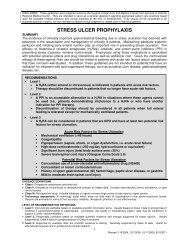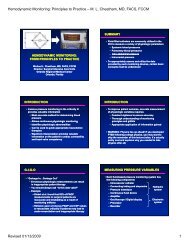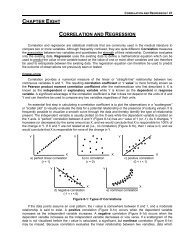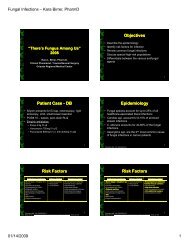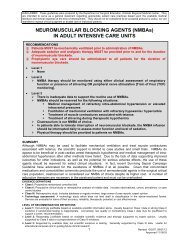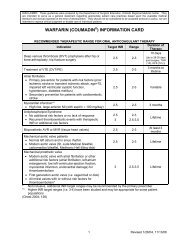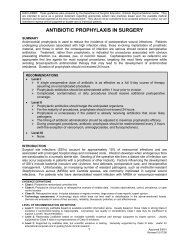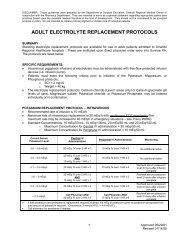post-splenectomy vaccine prophylaxis - SurgicalCriticalCare.net
post-splenectomy vaccine prophylaxis - SurgicalCriticalCare.net
post-splenectomy vaccine prophylaxis - SurgicalCriticalCare.net
Create successful ePaper yourself
Turn your PDF publications into a flip-book with our unique Google optimized e-Paper software.
POSTSPLENECTOMY PATIENT INFORMATION SHEET<br />
Name:<br />
Splenectomy (splee-nek-tuh-mee) is the name of the operation that was done to remove your spleen.<br />
The spleen is a fist-sized organ located in the upper left side of your abdomen (belly). The spleen helps<br />
you fight infections, get rid of old or damaged red blood cells, and store blood for your body. Because of<br />
either disease or damage to your spleen, it had be removed. You can live without a spleen, but you may<br />
be at a higher risk for certain types of blood infection. To help you fight these infections in the future, you<br />
have been given the following immunizations (shots):<br />
□ Pneumococcal <strong>vaccine</strong>, polyvalent (Pneumovax 23)<br />
**Revaccinate every 6 years**<br />
□ Age > 55: Meningococcal polysaccharide <strong>vaccine</strong><br />
(Menomune A/C/Y/W-135) **Revaccinate every 3-5 years**<br />
□ Age 16-55: Meningococcal polysaccharide/diphtheria toxoid conjugate <strong>vaccine</strong><br />
(Menactra A/C/Y/W-135) **May need revaccination every 3-5 years**<br />
□ Haemophilus influenzae type b conjugate <strong>vaccine</strong><br />
**No revaccination needed**<br />
Date:<br />
Date:<br />
Date:<br />
Date:<br />
It is important that you go and see a doctor IMMEDIATELY if you have any of the following symptoms:<br />
• Fever<br />
• Chills<br />
• Abdominal pain<br />
• Skin rash, swelling, redness, or infection<br />
• Diarrhea<br />
• Achy or weak feeling<br />
• Cough<br />
• Vomiting<br />
These are signs that you may have an infection. Without your spleen, a small or minor infection my<br />
become very serious and your doctor needs to examine you and possibly start antibiotics to help your<br />
body fight the infection. Always check with your doctor before any dental or invasive procedures, as you<br />
may need to take antibiotics before the procedure.<br />
The effect of the <strong>vaccine</strong>s in preventing infection varies from patient to patient and depends on the<br />
strength of your immune system when the <strong>vaccine</strong>s were given. You will need to be re-immunized (have<br />
the shots again) approximately every 5 years for the rest of your life. You should make sure that your<br />
doctor has a copy of this information sheet so that they can help remind you when it is time to be reimmunized.<br />
If you or your doctor have any questions about the above information, you should contact your<br />
surgeon:<br />
Surgeon’s Name:<br />
Surgeon’s Phone Number:<br />
6 Approved 1/7/03<br />
Revised 10/17/06


